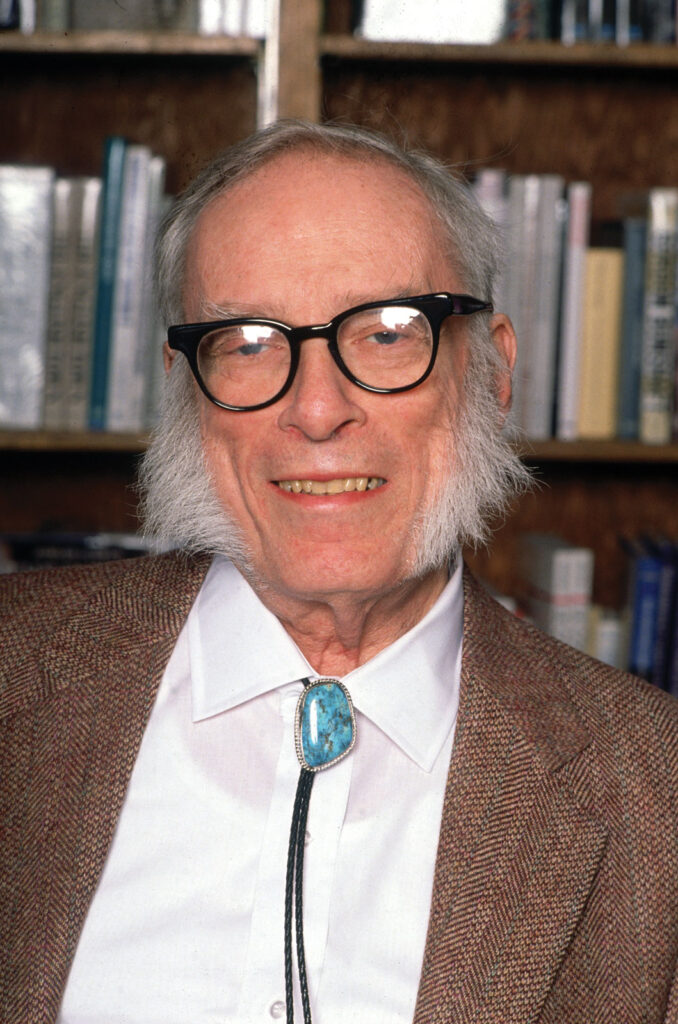Would you like to write as many books (over 500) as Dr. Isaac Asimov? Let’s find out how he did it.
Writer Charles Chu studied Asimov’s autobiographies and distilled six habits Asimov developed and used to write so many enjoyable books. Below is my summary of that list, put in my own words. I’ve added a seventh bonus habit as well.
- Read to Learn. Don’t stop educating yourself, even though you’ve finished formal school. Take Mark Twain seriously, and “never let school interfere with your education.” Read a lot, and on many different topics. You never know what will spark your muse.
- Bypass Writer’s Block. Sometimes you might get stuck, either because you don’t know what to write next, or because you’ve been over and over your story so many times you can’t stand it anymore. When that happened to Asimov, he shifted to a different writing project. When you return to the project that gave you writers block, you’ll approach it with a fresh perspective, and you may find you’re now ready to finish it.
- Ignore the Mental Antibodies. Within you dwell antibodies whose job is to identify, attack, and eliminate bacteria and viruses. You have mental antibodies, too, and they ‘protect’ you from ideas that are different or scary, notions that might get criticized by readers. This causes insecurities and fears. These antibodies can turn you into a perfectionist, forever editing and never submitting, or cause you to abandon a writing project altogether. Asimov never became a perfectionist. Aware of the danger of mental antibodies, he just forged ahead and wrote.
- Lower Your Bar. As mentioned, Asimov wasn’t a perfectionist. He loved to quote Robert Heinlein’s phrase, “They don’t want it good. They want it Wednesday.” Asimov developed confidence, then pride, in his writing. (Perhaps a bit beyond pride.) His self-assurance enabled him to rise above doubts, to avoid over-editing. Obviously, this is a learned skill. Don’t put trashy first drafts into the marketplace and expect them to sell.
- Don’t Take Breaks. Maybe your first story failed to sell, and you think it will help your writing if you take some time off. Or maybe your story did very well, and you feel you deserve to rest on your laurels awhile. Asimov never did that. He kept working, always concentrating on the Work in Progress (WIP) rather than the work most recently published.
- Stuck for an Idea? Think Harder. New writers and non-writers often ask authors where they get their ideas. Asimov got asked too, and his answer was, “by thinking and thinking and thinking till I’m ready to kill myself…Did you ever think it was easy to get a good idea?” Note the adjective ‘good.’ Like most people, he probably got many ideas to write about, but found a low percentage worthy of his time. More thought generally solved that problem for him.
Charles Chu ended his list at six, but hinted at a seventh Asimov habit for being a prolific writer, so I’ll state it outright:
- Write Every Day. Maybe you can’t equal Asimov’s work schedule—eight hours a day, seven days a week. But if you adopt the previous six habits, you’ll achieve a reproducible process where more time writing results in more publishable output.
Perhaps you won’t write 500 books, but there are degrees of prolificness, so you could end up further to the right on that spectrum than you expected. Thanks to the wisdom of Isaac Asimov, that’s the aim of—
Poseidon’s Scribe

